Valet parking offers the convenience of having a professional park your car, saving time and effort in busy areas, and reducing stress when searching for a spot. Self-parking provides greater control over your vehicle and can be more cost-effective, especially in locations where parking fees vary based on service. Choosing between valet and self-parking depends on priorities such as convenience, cost, and personal preference for vehicle security.
Table of Comparison
| Feature | Valet Parking | Self-Parking |
|---|---|---|
| Convenience | High - Staff parks for you | Moderate - You park your vehicle |
| Cost | Typically higher due to service fees | Generally lower or free |
| Time Efficiency | Faster drop-off and pick-up | May require more time to find a spot |
| Security | Professional handling reduces risks | Increased exposure to theft or damage |
| Availability | Limited by valet service capacity | Dependent on parking lot space |
| Vehicle Access | Retrieve keys from valet staff | Immediate access to your parked car |
Introduction to Valet and Self-Parking
Valet parking offers a convenient option where drivers hand over their vehicle to a professional, ensuring quick drop-off and retrieval, often found at hotels, restaurants, and event venues. Self-parking allows drivers to park their own vehicles, providing full control and typically lower costs, commonly available in shopping centers and public garages. Each method caters to different needs, balancing convenience, cost, and accessibility preferences.
How Valet Parking Works
Valet parking involves a professional attendant who parks your car for you, providing convenience and time-saving benefits at busy venues or upscale establishments. Customers hand over their vehicle keys to the valet, who then locates, parks, and later retrieves the car upon request. This service often includes secure parking areas and can reduce the stress of finding a parking spot in crowded locations.
How Self-Parking Works
Self-parking involves drivers manually locating an available parking space and maneuvering their vehicle into it without assistance. Modern parking facilities often integrate technology such as sensors and mobile apps to help drivers find open spots efficiently, reducing search time and congestion. Unlike valet parking, self-parking puts the responsibility on the driver to handle parking, offering more control and potentially lower costs.
Cost Comparison: Valet vs Self-Parking
Valet parking typically incurs higher fees due to service charges and tipping, averaging 20-40% more than self-parking options. Self-parking offers a cost-effective alternative, with hourly rates significantly lower, especially in urban areas where long-term parking fees can escalate. Choosing between valet and self-parking depends on budget considerations balanced against convenience and time savings.
Convenience and Accessibility
Valet parking offers unmatched convenience by allowing drivers to hand over their vehicle to a professional, eliminating the need to search for parking spaces. Self-parking provides greater control and accessibility, enabling drivers to choose their preferred spot and manage their own time. Both options address different needs, with valet services ideal for those seeking effortless access and self-parking favored by individuals prioritizing independence and flexibility.
Security and Vehicle Safety
Valet parking offers enhanced security measures including monitored drop-off points and professional handling, reducing risks of theft and damage. Self-parking allows drivers to maintain control over their vehicle, minimizing potential mishandling but may increase exposure to unsecured areas. Comparing surveillance systems and staff training levels is crucial in determining the safest parking option.
Time Efficiency: Which is Faster?
Valet parking saves time by allowing drivers to immediately hand over their keys and leave their vehicles, eliminating the search for available spots. Self-parking often requires additional minutes to locate parking spaces and walk back to the destination, especially in crowded lots. Studies show valet services can reduce parking time by up to 50%, significantly enhancing overall time efficiency.
User Experience and Preferences
Valet parking offers a seamless, time-saving experience by relieving users of the hassle of finding a spot, which appeals to those prioritizing convenience and luxury. Self-parking attracts users who value control over their vehicle and prefer a cost-effective option, often favoring locations with ample, well-marked spaces. Preferences largely depend on individual priorities such as speed, safety, and budget, with urban areas showing higher demand for valet services due to limited parking availability.
Environmental Impact
Valet parking typically results in increased emissions due to vehicles circling or idling while awaiting pick-up, contributing to higher carbon footprints. Self-parking allows drivers to park more efficiently, often in designated spaces closer to entrances, reducing overall driving distances and fuel consumption. Studies indicate that self-parking can reduce greenhouse gas emissions by up to 20% compared to valet services in urban settings.
Choosing the Right Parking Option
Choosing the right parking option depends on convenience, cost, and the nature of your visit. Valet parking offers time-saving and premium service ideal for events or busy locations, while self-parking provides more control and often lower prices, suited for longer stays or budget-conscious drivers. Evaluating factors like location, duration, and personal preferences ensures optimal parking efficiency and satisfaction.
Valet parking vs self-parking Infographic

 cardiffo.com
cardiffo.com